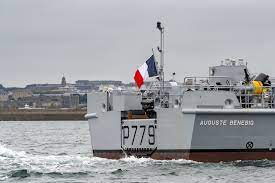By Nic Maclellan
The French Senate in Paris has issued a report sharply critiquing France’s official Indo-Pacific Strategy, highlighting the lack of capacity of French military forces deployed in the Indian and Pacific Oceans.
The report from the Senate Foreign Affairs, Armed Forces and Defence Committee questions the gulf between rhetoric and reality in Indo-Pacific policy. The report says “our ambitions to be a balancing power are not in line with our real weight, which ultimately raises questions about the very credibility of our strategy.”
France’s Indo-Pacific Strategy was first released in July 2021, with President Emmanuel Macron stating that “France wants to be a stabilising force, promoting the values of freedom and rule of law.”
A revised version of the strategy was released in February the following year, after disruption of diplomatic relations with Australia and the United States by the AUKUS announcement and abandonment of the US$90 billion Naval Group contract to build submarines for the Royal Australian Navy. The updated strategy noted that: “Australia’s decision in September 2021, without prior consultation or warning, to break off the partnership of trust with France that included the Future Submarine Program (FSP), has led to a re‑evaluation of the past strategic partnership between the two countries.”
Since May 2022 elections in Australia, the new Australian Labor Party (ALP) government under Prime Minister Anthony Albanese has sought to rebuild relations with the French government, even after President Macron lost his majority in the French National Assembly.
In January, an Australia-France 2+2 meeting of defence and foreign ministers in Paris lauded France as a “Pacific nation.” The Albanese government has pledged to extend military ties with France in the Pacific, with both countries agreeing “to deepen operational and logistical cooperation to support their commitment to shared interests in the Indo-Pacific.”
In recent months, the French military have mounted extensive public relations campaigns to highlight their Indo-Pacific capacity, promoting Operation Pegasus – the deployment of three Rafale fighters flown from France to New Caledonia in August 2022. Recent social media images feature the new OPV patrol boat Auguste Bénébig, to be based in Noumea.
Despite this, the French Senate report highlights the constraints facing military forces in the Pacific, where two ageing frigates, patrol boats and helicopters are used mainly for humanitarian and disaster response rather than broader strategic roles.
France claims an Exclusive Economic Zone of 7 million square kilometres in the Pacific islands, but the Senate report says its capability to monitor the area is very weak “due to the chronic lack of equipment for the sovereignty forces, the Armed Forces of New Caledonia (FANC) and the Armed Forces in French Polynesia (FAPF).”
President Macron’s Indo-Pacific strategy highlights France’s status as a Pacific power because of its control of New Caledonia, Wallis and Futuna and French Polynesia, as well as French colonial dependencies in the Indian Ocean.
However, the French Senate report notes that the Indo-Pacific Strategy was designed without involvement of Kanak and Maohi politicians, who “were not consulted by the metropolitan executive power prior to the adoption of the strategy, or, more recently, the deployment of military forces in their territories.”
Since his election in July 2021, President Louis Mapou of New Caledonia has sought to build closer ties to neighbouring countries in Oceania. Speaking to Islands Business at the 51st Pacific Islands Forum last July, President Mapou said: “We are at the crossroads between those who advance France’s strategic interests and our desire as New Caledonians – especially in a government headed by an independence leader – to seek greater integration in our region.
“France claims its place in our region through its overseas territories,” Mapou said. “There’s no doubt that France needs New Caledonia and French Polynesia to maintain its Indo-Pacific strategy, facing other major powers in the region. But this is not our project – we want to engage with our neighbours in the Pacific region.”
In the new Foreign Affairs Committee report, French Senators acknowledge that “the President of the Government and the President of the Congress of New Caledonia explained to us that they did not expect much from France but rather from Australia and New Zealand, even questioning the deployment of planes as part of Operation Pegasus.”
Criticising “a notable absence of any discussion of the French presence in the region” at last year’s Forum, President Mapou said: “When people talk about possible military bases in countries like the Solomon Islands, we wonder – where is the discussion about the military agreements that France has in the region through its territories?”
Under international law, France is the administering power of the Non-Self-Governing Territories of New Caledonia and French Polynesia. For many years, the United Nations General Assembly has repeatedly questioned the deployment of French military forces and presence of military bases in its colonial dependencies.
The UN Special Committee on Decolonisation has deplored “the continued alienation of land in colonial and Non-Self-Governing Territories, particularly in the small island territories of the Pacific and Caribbean regions, for military installations.” The UN Special Committee, which includes Fiji and Papua New Guinea as members, has called on “administering Powers to terminate military activities and eliminate military bases in Non-Self-Governing Territories under their administration, and provide alternative sources of livelihood for the peoples of those Territories.
SOURCE: ISLAND BUSINESS/PACNEWS













